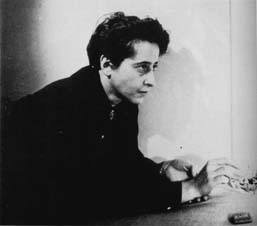



With apologies, I have not been able to find an adequate biography of Hannah Arendt nor are there any useful Web sites.
Arendt was born in Hanover, Germany, in 1906. This makes her the only foreign born philosopher that we will ready in this course on American Philosophy, and it also calls into question why I have classified her as "American." The answer is that Arendt came to America as a young woman, still in her twenties, and remained for the rest of her life. But she did not "just remain" here; she became an enthusiast for and articulate advocate of American democracy. Her essays on politics reflect all the difficult problems of the modern age and easily stand up to the essayists of the Federalist period.
As an eighteen-year old first-year student at the University of Marburg, in 1924, Hannah Arendt enrolled in a philosophy course taught by Martin Heidegger. Heidegger was married and had two young sons; he was just completing his first and most famous work, Being and Time. Within months, Arendt and Heidegger were involved in a passionate affair which was intellectually stimulating, psychologically fulfilling, and sexually intimate, though obviously unequal and diverse in its impact on both. Not only did they both successfully avoid the disasterous consequences potential in such a situation, but they remained bound to each other in a lifelong friendship. Arendt died in December 1975, and Heidegger died in May 1976. They had seen each other for the last time, in Switzerland, in August of 1975.
The only time in this relationship that Arendt and Heidegger were alienated from each other was from 1933 through 1950; and this reveals important facts about both. While Arendt's family was fully "assimilated" and apparently rather unreligious, Arendt was a Jew. In 1933, she was forced to flee Germany; by 1941, she arrived in the United States. In between, she lived in France, where she worked for immigration of Jewish refugee children into Palestine. Heidegger, on the other hand, was married to a Catholic Nazi sympathizer and seems himself to have been caught up in a "romantic" support of National Socialism. The wound was deep; but Arendt seems to have accepted Heidegger's own version of his life from 1933 through the end of the War and to have become a champion for his philosophical thought in America.
Arendt actually studied at the University of Freiburg and the University of Heidelberg as well. In fact, she studied under Karl Jaspers at Heidelberg, where she received her doctorate. Arendt worked in a number of pursuits in America and held a number of (mostly visiting) university appointments, including one of the Graduate Faculty at the New School for Social Research. She was a prolific writer.
Sources: Ettinger, Elzbieta. Hannah Arendt, Martin Heidegger (Yale University Press, 1995)
Back to Contents
